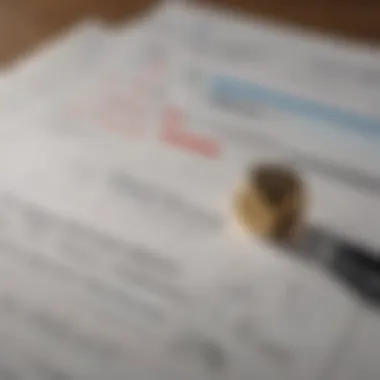Calculating Your Mortgage Payoff Amount Effectively


Intro
Understanding how to calculate your mortgage payoff amount is crucial for homeowners looking to gain control over their financial futures. Whether you're aiming to pay off your mortgage early or simply want to know where you stand, having a comprehensive grasp of your mortgage payoff is a valuable skill. This guide will navigate the landscape of mortgage calculations, help clarify essential terms, and empower you to take charge of your loan obligations. By dissecting the components involved and considering various scenarios, you'll be better prepared to make decisions that align with your financial goals.
Understanding Financial Concepts
Mortgage payment calculations can seem overwhelming, especially to those who don’t regularly engage with financial concepts. However, having a solid foundation in certain terms and principles can simplify the process.
Definitions of Key Terms
Before diving deep into calculations, it’s critical to familiarize yourself with a few fundamental concepts:
- Principal: This is the original loan amount that you borrow from the lender. As you make payments, this amount decreases.
- Interest Rate: The cost of borrowing money, expressed as a percentage of the principal. The rate can be fixed or variable.
- Amortization: This refers to the way loan payments are structured over time, which typically involves higher initial interest payments that decrease as the principal balance drops.
- Payoff Amount: This is the total amount you need to pay to fully satisfy the mortgage loan, including any outstanding principal, interest, and possible fees.
Familiarity with these terms will enhance your understanding of how mortgage calculations function, enabling effective budgeting and planning.
Importance of Financial Literacy
Being financially literate goes beyond understanding basic terms; it’s about cultivating the ability to make informed decisions that affect your long-term financial situation. Financial chaos can sneak up on you if you are unaware of how loans, interests, and fees play into your total obligations.
"A lack of clarity around your financial situation can lead to missed opportunities and increased costs."
Creating a Personal Budget
Building a budget is essential in harnessing your financial power. This not only involves tracking mortgage payments but also understanding how they fit within your broader financial picture.
Setting Financial Goals
Start by identifying your short-term and long-term financial goals. Consider these questions:
- Do you want to pay off your mortgage early?
- Are you looking to invest or save for retirement?
- What monthly payment fits comfortably within your budget?
Setting tangible financial goals provides motivation and a clear roadmap for how to approach your mortgage payments tackling other financial responsibilities simultaneously.
Tracking Income and Expenses
After establishing these goals, the next step involves diligently tracking your income and expenses.
- Income includes your salary, bonuses, any side hustles, or investments.
- Expenses should encompass all monthly outgoings, particularly your mortgage payment, utilities, and living costs.
It's beneficial to use tools like budgeting apps or spreadsheets to visualize your financial landscape. This may provide insights on areas where you could cut back, freeing up funds to move toward your mortgage payoff or savings for future investments.
By staying on top of your financial realities and armed with a clear understanding of key concepts, you will be solidly positioned to make informed decisions about your mortgage journey.
Understanding Mortgage Basics
Understanding the basics of mortgages is essential before diving into the specifics of calculating the payoff amount. A mortgage is more than just a loan; it's an agreement that shapes your financial future and homeownership experience. Having a firm grasp on how mortgages function, along with their components, can ultimately save you a considerable sum over the life of the loan. It helps to demystify the often-daunting world of home loans, making it easier to navigate your financial waters with confidence.
What Is a Mortgage?
A mortgage is essentially a security for lenders, a way to ensure that they can recover funds lent to homeowners. When you take out a mortgage, you’re borrowing money to buy a home, with the property itself serving as collateral. If you default on the loan, the lender can seize your home through a legal process called foreclosure.
In practical terms, when you make your monthly payments, you slowly build equity in your home — the portion of the property that you actually own. This equity is critical, as it can influence your financial strategies down the line, whether you want to refinance, sell, or tap into that value through home equity loans.
Types of Mortgages
There are various types of mortgages to fit unique financial situations and goals. Here are some of the most common:
- Fixed-Rate Mortgages: These loans maintain the same interest rate for the entire loan term, typically 15 to 30 years. Stability is a major perk, as your monthly payment remains unchanged.
- Adjustable-Rate Mortgages (ARMs): The interest rate on these loans is typically lower initially, but it can fluctuate after a set period, reflecting changes in market rates. This can be risky but may lead to savings if rates remain low.
- Interest-Only Loans: Borrowers pay only the interest for a specified period, leading to lower initial payments. However, once that period ends, payments increase significantly as principal repayments kick in.
Understanding these options can help you make sound decisions that align with your financial situation. Each type of mortgage has its pros and cons, and recognizing them can play a pivotal role in your overall financial health.


Interest Rates and Their Impact
Interest rates are fundamental to your mortgage's cost and overall payments. They determine how much additional money you’ll pay over the life of the loan. Even a slight change can have ripple effects on your total financial obligation.
- Market Conditions: Rates fluctuate based on the economy, inflation, and Federal Reserve policies. When rates dip, it can be a prime opportunity to refinance your existing mortgage to save on interest payments.
- Credit Score: Your creditworthiness directly impacts the interest you’ll receive. A better score generally translates to lower rates, which can save thousands over the lifespan of the mortgage.
Knowing how interest rates work allows you to gauge your financial decisions better, helping you to plan ahead whether it’s securing a better rate or timing your refinancing option.
Understanding these mortgage basics not only helps in figuring out your payoff amount but also informs your long-term financial strategy.
Components of a Mortgage Payoff Amount
Understanding the components of your mortgage payoff amount is crucial for those navigating their financial landscape. This section aims to demystify what factors contribute to your total payoff, providing you with clarity and the ability to make informed decisions. Each component plays a significant role, affecting not only the total amount owed but also your future financial planning. Knowing these components in detail can help you strategize your payments, minimize costs, and optimize your financial health.
Principal Balance
The principal balance is the initial amount borrowed from your lender, excluding interest and any fees. This figure constantly decreases over time as you make regular payments. Essentially, it’s the core of your mortgage; understanding it helps you appreciate how much of your payments are truly going towards paying off what you owe.
When you first secure your mortgage, this balance is at its highest. As time passes and payments are made, it decreases, ideally to zero by the end of the loan term. One key takeaway is recognizing that your principal balance does not directly include any accrued interest, which leads us to the next component.
Use the following list to grasp how principal payments affect your balance:
- Regular Payments: Each payment chips away at the balance, typically starting off with more interest.
- Extra Payments: If you choose to throw in additional payments, it can significantly speed up your payoff time, and save you interest overall.
- Loan Terms: The length of your mortgage influences how fast you can expect your principal to decline. Shorter loans mean faster payoff.
Interest Accrued
As you pay down your principal, interest accrues on the outstanding balance. This interest can significantly affect your total payoff amount; it’s the extra cost you incur by borrowing money. In many cases, especially with long-term loans like a 30-year mortgage, a large portion of your early payments go toward interest rather than the principal.
It is important to track how this interest compounds over time. For example, as time goes on, a smaller percentage of each monthly payment is applied to interest, allowing more to touch the principal. This is often where homeowners face a rocky road. One month they think they can put away a bit more, only to see a larger chunk of their payment vanish to interest.
Key factors regarding interest:
- Type of Interest: Understand whether your mortgage has a fixed or adjustable-rate. Fixed means predictability; adjustable means variability.
- Payment Frequency: Monthly frequencies are standard but some loans allow biweekly payments that can reduce total interest.
Prepayment Penalties
Prepayment penalties are fees that some lenders might impose if you pay off your mortgage ahead of schedule. This may sound counterintuitive, but it’s essential to know if your loan has this clause. Generally, these are included to protect lenders from the lost interest that they would have collected over a longer loan period.
When looking at your overall payoff strategy, it’s wise to check for prepayment penalties. They can take the wind from your sails, especially if you plan to make additional payments regularly. Before diving into extra payments, consider these elements:
- Terms of your Loan: Not all mortgages carry prepayment penalties. If yours does, check the terms carefully.
- Duration of Penalty: Some penalties are only applicable within the first few years, while others might extend the entire loan term.
- Calculating Potential Savings: If you foresee making extra payments, calculate if the savings from reduced interest outweigh the costs of the penalty.
"Being informed about your mortgage components is not just smart; it’s essential for effective financial management."
In summary, understanding the principal balance, interest accrued, and any potential prepayment penalties forms the foundation for grasping your mortgage payoff amount. This knowledge arms you with the insight needed to manage your mortgage more effectively, whether you are making regular payments or considering additional strategies. By being proactive and aware of these components, you can maximize your financial advantages and make better choices regarding your mortgage.
Calculating the Payoff Amount
Calculating your mortgage payoff amount is like peeling back the layers of an onion. While it may seem straightforward at first glance, various factors contribute to the total, and understanding these elements is essential for homeowners. Knowing how to accurately compute this figure can save you more than just money; it can enhance your financial strategy and empower you to make informed decisions about your property. Digging into the right calculations can help you avoid unpleasant surprises when you’re looking to settle your mortgage.
Gathering Necessary Information
Before you jump into the numbers, you need to gather some key details. This part is crucial because missing even a small piece of information can throw off your entire calculation. At the very least, you’ll need to know:
- Current Principal Balance: This is how much you still owe on your mortgage, not including interest. You can find it on your latest mortgage statement or by contacting your lender.
- Remaining Term: This refers to how long you have left on your mortgage. Sometimes, lenders can provide this in a handy statement, but it's also noted in your loan documents.
- Interest Rate: Knowing your current interest rate is critical. If you’ve refinanced, or if your mortgage has an adjustable rate, this may change how you approach the payoff calculation.
- Any Fees: Don’t forget to account for any potential fees, such as prepayment penalties or administrative fees that might apply when you pay off your mortgage before the due date.
By pulling together these pieces, you’ll be in a stronger position to analyze your payoff amount accurately.
Using Amortization Tables


Amortization tables are like those old maps that are jam-packed with information. They show you how your payments break down into principal and interest over time. When you’re attempting to calculate your payoff amount, these tables can provide significant insight.
- Locate Your Amortization Table: You might find this in your loan documents or use an online calculator. Websites like en.wikipedia.org generally have resources to help you find one.
- Identify Your Remaining Payments: Filter down to the remaining payments left on your mortgage using the table. This will help you tally up how much interest remains.
- Calculate Total Remaining Interest: Once you have the remaining payments, multiply by the current interest rate divided by 12 (to reflect monthly payments). This gives you a clearer view of how much you'll pay in interest up to the payoff date.
Utilizing an amortization table can turn what seems like a complex calculation into a user-friendly process, making sure you're not left holding the bag later on.
DIY Calculation Methods
If you're the type who enjoys getting their hands dirty, you might prefer to calculate the payoff amount without relying on tables or online tools. The DIY approach involves some straightforward math but be warned, it requires your full attention:
- Principal Remaining: Start by noting your current principal balance. This is typically found on your monthly statement or through your lender.
- Interest Calculation: (Current Principal Balance) x (Interest rate/12) x (Number of remaining payments). This helps you forecast how much interest will still accrue.
- Payoff Total: Add the interest calculations to your principal balance. If applicable, be sure to include any prepayment fees your lender may charge.
By doing it yourself, you gain a deeper understanding of exactly what you’re paying every month and how it influences your total payoff amount. This method, while perhaps a tad more labor-intensive, can provide you with a clear perspective on your mortgage finances.
"Knowledge is power when dealing with finances—especially when it involves your hard-earned money and your home."
Grasping these elements of calculating your payoff amount becomes essential in formulating a robust financial plan. It can truly illuminate your path and pave the way for future investment decisions.
Mortgage Payoff Scenarios
Understanding the various mortgage payoff scenarios offers homeowners invaluable insight into how their decisions impact their financial future. Each scenario can change not just the immediate payoff amount, but also a borrower's long-term financial health. Hence, it’s crucial to examine the implications of different paths one might take when managing a mortgage.
After Making Extra Payments
One of the simplest yet most profound strategies for paying down a mortgage faster is making those extra payments. When you contribute additional funds towards the principal, you can significantly reduce the total interest paid over the life of the loan. This practice not only shaves off months or years from the loan term but also builds equity faster.
For instance, let’s say your monthly mortgage is $1,200, and you decide to throw in an extra $200 each month. Over time, this could save you thousands in interest and potentially allow you to exit the mortgage contract earlier than planned. However, it is important to confirm with your lender that these additional payments go directly to the principal. Some lenders might apply them differently, which could lead to unexpected complications.
Refinancing Implications
Refinancing a mortgage can feel like walking a tightrope. It can lower your interest rate and reduce your monthly payments, but it also presents its own unique challenges. When refinancing, you’ll need to calculate any fees associated with the new loan and consider how long it’ll take to break even on those costs. In some cases, homeowners end up paying more in the long term due to fees and extended loan terms.
For example, if you refinance from a 30-year mortgage at a 4% interest to a 30-year mortgage at 3%, you could save a substantial amount monthly. But what if the refinancing costs $5,000? You’ll need to stay in the home long enough for those savings to exceed the cost of refinancing. It becomes a calculative game, weighing potential monthly savings against upfront costs. So consider your future plans—are you likely to stay in this home long enough to make it worth it?
Selling Property
Selling your property is another classic scenario that can affect your mortgage payoff amount. If you decide to sell, it is crucial to understand how the sale price influences your payoff amount. Your lender will calculate the payoff amount before the sale, considering both principal and interest due until the sale concludes. However, it’s wise to account for additional considerations in the sale process, such as closing costs and real estate commissions, which can subtract from your profit.
For instance, if your home sells for $300,000, but you owe $200,000 on your mortgage, you would think you have a nice profit. But if selling costs you an estimated 7% in commissions and fees, that’s $21,000. Thus, you’d net only $79,000.
In all these scenarios, it’s about understanding the bigger picture—how each decision affects your financial situation ultimately determines your strategy going forward. Therefore, representing not merely avenues for payoff but rather pathways to greater financial flexibility.
Obtaining the Payoff Quote
When it comes to assessing your mortgage obligations, obtaining a payoff quote from your lender is an essential step. This quote serves as a specific snapshot of what you owe at a set point in time. It’s not just about the overall amount remaining on your mortgage but includes various factors that affect the total payout. Understanding why this quote is important can help you navigate your mortgage journey with confidence and precision.
To start, the payoff quote reflects not only your principal balance but also the interest that has accrued up to the payoff date. Furthermore, it might take into consideration any additional fees or charges, such as prepayment penalties or transactional fees, which could significantly affect the total amount you owe. By getting an accurate quote, you can avoid unpleasant surprises when you decide to pay off your mortgage or when selling your property.
Requesting from Lender
Reaching out to your lender for the payoff quote is a straightforward process, yet it’s not always as clear-cut as it seems. First, you’ll want to have the necessary details at hand, such as your loan number and personal identification information. When you contact your lender, be specific about why you need the quote. Whether you’re considering selling your home or contemplating a refinance, informing them of your purpose can ensure that you get the most relevant information.
Some lenders offer online portals where you can request a payoff quote with a few simple clicks. Alternatively, you may prefer to call or email your lender directly. Be aware that some lenders may charge a fee for this request, while others may provide it free of charge.
Understanding the Payoff Statement
Once you have your payoff statement in hand, it's time to dissect it. The statement should clearly itemize the total payoff amount, breaking down the components that contribute to this sum. Here’s what to look for:


- Principal Balance: This is the amount of money you initially borrowed minus any principal payments you’ve made.
- Accrued Interest: This represents the interest that’s built up since your last payment and is a crucial part of the payoff amount.
- Fees: These can include anything from prepayment penalties to administrative fees, which may affect your total due.
A clear payoff statement will also provide a specific payoff date, which is important because interest can change from day to day. If you pay off your mortgage after that date, you will owe a different amount.
"Obtaining a clear and thorough payoff statement ensures you understand every component of your mortgage obligations and can avoid financial pitfalls."
By taking the time to thoroughly review the payoff quote and understanding the components, you are better equipped to plan your financial future. Whether it's deciding to pay off your mortgage early or strategizing for future investments, having a solid grasp of your mortgage will place you in a much better position.
Considerations Beyond the Payoff Amount
When diving into the nitty-gritty of mortgage payoff, many people focus solely on the figures at hand. Sure, knowing how to calculate the exact payoff amount is crucial, but overlooking other considerations can lead to a world of hurt down the line. This section highlights key components that extend beyond just numbers, offering insights into financial ramifications that can shape your future.
Impact on Credit Score
Paying off a mortgage is a massive milestone, a real feather in one’s cap. However, before popping the champagne, it’s good to think about how it affects your credit score. Historically, your mortgage has played an essential role in your credit profile. Lenders like to see a mix of credit types, and having a home loan is often seen as a sign of responsibility.
When you pay off your mortgage, one might assume their score will catapult straight to the stars. While settling your biggest debt might improve your credit utilization, it can also temporarily ding your score if you have fewer credit accounts remaining. This situation arises because of your credit mix.
- Keep in Mind:
- A good credit mix usually supports a healthier score.
- Closing your mortgage account can remove some of your credit history.
So, in essence, check your credit standing well before making any rash decisions. You might want to consider keeping other revolving accounts active to balance things out.
Tax Implications
Navigating the tax landscape is vital, particularly when it comes to home financing. While you might relish the idea of being mortgage-free, don’t forget the tax consequences that can come along with it. For homeowners, mortgage interest is often tax-deductible, particularly in the earlier years when interest is at its peak.
When calculating your mortgage payoff amount, remember that not only could you lose a steady tax deduction but also potential itemized deductions or credits that could apply later.
- Key Takeaways:
- Assess how your tax situation changes after paying off your mortgage.
- Consult a tax advisor to understand if you will benefit from itemizing—if your deductions drop, you might want to reconsider that last payment!
Ultimately, knowing what losing interest deductions means for your overall tax bill helps you prepare in advance.
Planning for Future Investments
Imagine you’ve just snagged a dream job with a hefty pay raise. It’s clear you’ll want to put that extra cash to good use. Once your mortgage is gone, many homeowners mistakenly assume all that extra cash flow should go into savings or retirement. While those are indeed wise moves, allocating funds toward future investments is equally essential.
Investing after paying off your mortgage not only helps diversify your portfolio but also allows the potential to earn higher returns than what you'd typically save.
- Pro Tips:
- Consider setting up an emergency fund to cover unexpected expenses first.
- Think about investing in stocks or real estate for long-term growth.
- Keep your eye on the market; opportunities abound, and those extra funds can work wonders.
Ultimately, a prudent approach involves integrating your mortgage payoff into your broader financial strategy. It can be tempting to kick back and enjoy freedom from monthly payments, but a bit of foresight can lead to substantial long-term gains.
By reflecting on these considerations, you pave the way for a brighter financial future rather than just viewing the payoff as the endpoint. The journey continues, after all.
Culmination
In the realm of homeownership, understanding how to accurately determine your mortgage payoff amount is paramount. It not only enhances your grasp of financial obligations but also empowers you to make more informed decisions regarding your property and investments. This concluding section underscores the significance of the concepts we've explored throughout this article, particularly for young professionals, students, and small business owners.
By recapping essential insights, homeowners can feel more prepared to engage with their mortgage lenders and navigate potential scenarios involving their loans. The dynamic landscape of mortgage management requires comprehension of numerous factors, which isn't just a tick-box exercise. It's about engaging with your financial well-being in a meaningful way.
To ensure clarity, let's distill what we've learned:
Recap of Key Points
- Understanding the Components: Grasping essential elements like principal balance, interest accrued, and any prepayment penalties is crucial.
- Calculating the Payoff Amount: Knowing where to find necessary information and how to utilize tools such as amortization tables can simplify what may seem like a complex equation.
- Examining Different Scenarios: Different circumstances, whether making extra payments, refinancing, or selling your home, can dramatically affect the payoff amount.
- Impacting Future Financial Decisions: Recognizing the interplay between your mortgage status, credit scores, tax implications, and potential future investments can shape your financial growth.
"Knowledge is power. As a homeowner, understanding your mortgage can save you money and prevent future headaches."
In summary, determining your mortgage payoff amount goes beyond simple mathematics. It requires a thoughtful approach that considers your unique financial landscape. By being equipped with the right knowledge, you can strategically plan your financial future with confidence.















